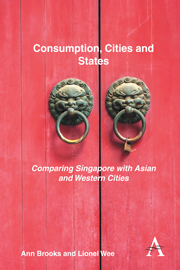Book contents
- Frontmatter
- Contents
- Acknowledgments
- Introduction
- Chapter 1 Consumption, Reflexivity and Citizenship in Global Cities
- Chapter 2 Orders of Reflexivity
- Chapter 3 Rescaling for Competitiveness
- Chapter 4 The Dynamics of State–Society Negotiations
- Chapter 5 (De-)Regulating Asian Identities: Comparing Asian Cities and States
- Chapter 6 Citizenship, Reflexivity and the State: Investigating ‘Defensive Engagement’ in a City-State
- Chapter 7 Governing the Citizen-Consumer: Citizenship, Casinos and ‘Cathedrals of Consumption’
- Chapter 8 Regulating Consumption and the ‘Pink Dollar’
- Chapter 9 States as ‘Midwives’ to Cities: Cosmopolitanism, Citizenship and Consumption in the Modern State
- References
- Index
Chapter 6 - Citizenship, Reflexivity and the State: Investigating ‘Defensive Engagement’ in a City-State
Published online by Cambridge University Press: 05 September 2014
- Frontmatter
- Contents
- Acknowledgments
- Introduction
- Chapter 1 Consumption, Reflexivity and Citizenship in Global Cities
- Chapter 2 Orders of Reflexivity
- Chapter 3 Rescaling for Competitiveness
- Chapter 4 The Dynamics of State–Society Negotiations
- Chapter 5 (De-)Regulating Asian Identities: Comparing Asian Cities and States
- Chapter 6 Citizenship, Reflexivity and the State: Investigating ‘Defensive Engagement’ in a City-State
- Chapter 7 Governing the Citizen-Consumer: Citizenship, Casinos and ‘Cathedrals of Consumption’
- Chapter 8 Regulating Consumption and the ‘Pink Dollar’
- Chapter 9 States as ‘Midwives’ to Cities: Cosmopolitanism, Citizenship and Consumption in the Modern State
- References
- Index
Summary
Introduction
A key issue in theorizing about citizenship concerns the relationship between a modernist state and the late modern conditions of existence. In this regard, it is important to consider the steps taken by the state as it attempts to reinvent itself in varying contexts of rapid transformation, and how such attempts are received by the populace (Ong 1999, 2006a; Sassen 2006). According to Ellison (1997), contemporary sociological perspectives on citizenship in late modernity are problematic because they fail to properly consider citizenship as a resource for negotiating social change. This is rather ironic since a key characteristic of life in late modernity is precisely the need for individuals to negotiate a slew of political, social and cultural changes, and there is no obvious reason why citizenship cannot be strategically adduced to aid in such negotiations. Clearly the capacity of individuals to respond to these changes will be differentiated by gender, class and ethnicity, among other factors (Skeggs 1997, 2005; Beck and Beck-Gernsheim 1996). Ellison provides a useful conceptual framework for understanding the steps taken by modern states to address change as they reinvent themselves in varying contexts of rapid transformation and how such attempts are received by the populace. Ellison's work is also useful in understanding how sociological accounts of citizenship connect in an interesting way with notions of reflexivity and what he calls ‘defensive engagement’.
- Type
- Chapter
- Information
- Consumption, Cities and StatesComparing Singapore with Asian and Western Cities, pp. 89 - 106Publisher: Anthem PressPrint publication year: 2014



